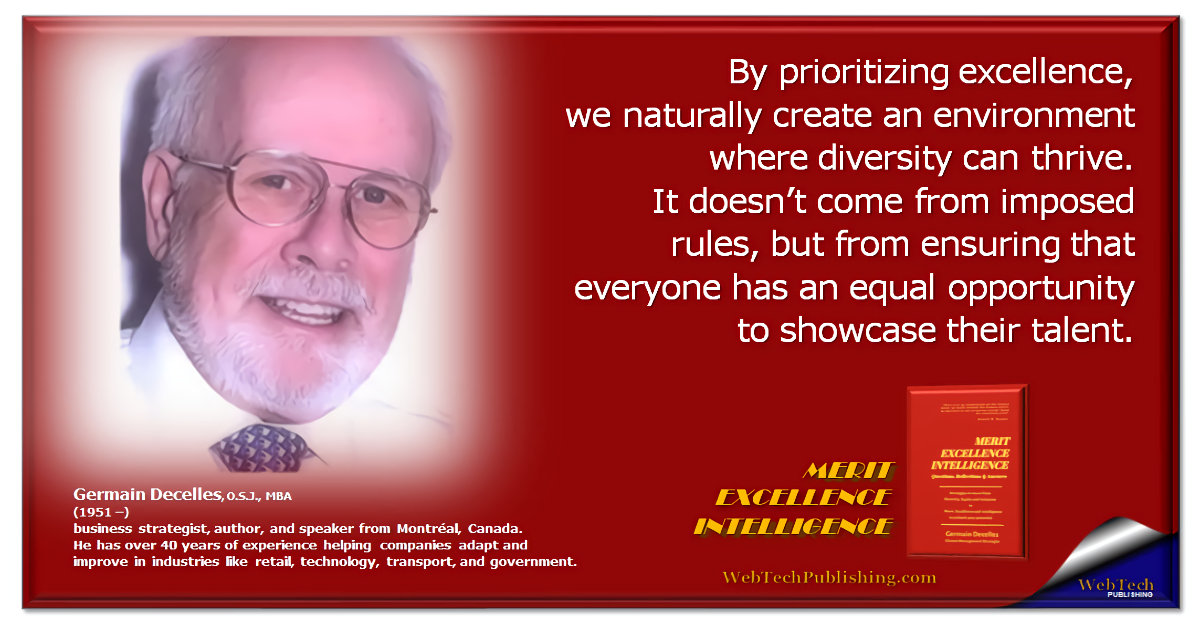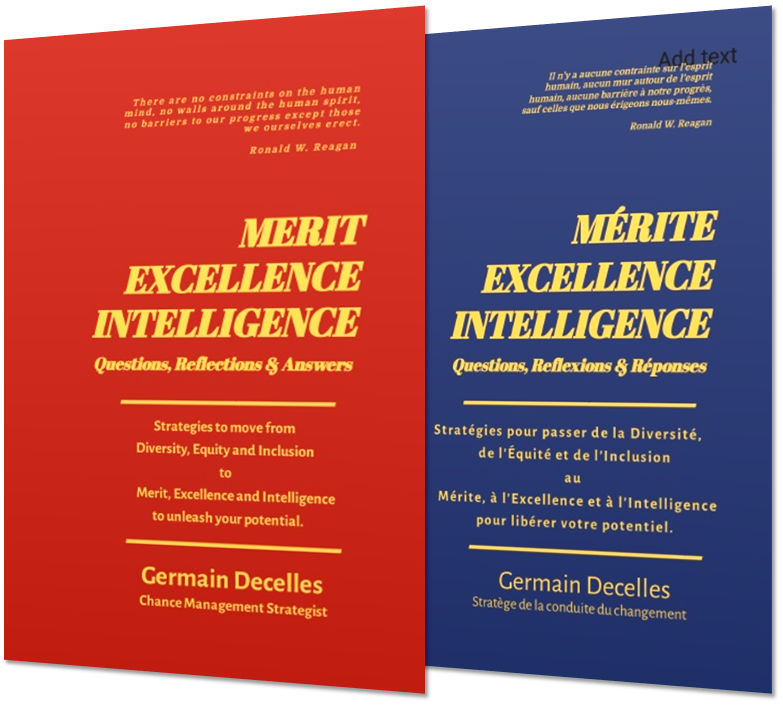|

The quotations, short texts, and photographs in this work
remain the exclusive property of their respective authors.
MUST WE CONFRONT DIVERSITY AND MERIT?
We are living in a time of deep questioning of social
and organizational models. In this context, the principles of
diversity, equity, and inclusion—grouped under the acronym
DEI—have become essential values in our institutions,
businesses, and public discourse. Their goal is to address
historical imbalances, promote fair access to opportunities,
and create environments where everyone can feel legitimate and
represented.
This intention is undeniably noble. It stems from a
concern for humanity and justice, aiming to address the
persistent divisions in our modern societies. Yet, over time,
many voices have begun to question the actual effectiveness of
these initiatives. Too often perceived as symbolic,
superficial, or leveraged for image purposes, DEI approaches
struggle to convince that they lead to lasting and meaningful
change.
It is in this climate of doubt and polarization that a
new model of thought is emerging MEI—Merit, Excellence, and
Intelligence. Unlike DEI, MEI chooses to focus on selection,
recognition, and advancement criteria on competence,
performance, and individual potential. The central idea is
simple: to move away from identity-based criteria in favor of
a merit-driven approach, founded on talent and effort, and
presented as a pathway to natural equity.
However, MEI is not without controversy. It raises
questions, provokes discussion, and at times divides opinion.
Rather than closing the debate, its emergence broadens it. It
prompts us to reflect on the values that underpin our
societies, as well as the mechanisms in place to enable each
individual to fully realize their potential.
MEI represents a true shift in perspective—a break from
traditional approaches rooted in identity-based criteria. It
asserts with conviction that recruitment, promotion, and
recognition processes should prioritize competence,
performance, and individual potential, rather than origin,
gender, or any other personal characteristic.
Through this lens, the goal is to restore a form of
equity through meritocracy. Raw talent becomes the reference
point, and intelligence in all its forms—whether analytical,
creative, or emotional—becomes the driving force of
advancement. MEI thus promotes healthy competition based on
merit rather than quotas, where each individual can aspire to
succeed according to what they are capable of achieving.
This model is based on a core belief: placing
excellence at the heart of the criteria allows diversity to
flourish naturally. A form of authentic diversity—not imposed
by artificial mechanisms—but revealed through the removal of
barriers and the opportunity given to each individual,
regardless of their background or identity, to demonstrate
their talent.
This model reshapes our reference points. It invites us
to rethink our understanding of equality and justice. Above
all, it raises a central question: are we truly willing to
acknowledge each individual's real talents and skills, rather
than stopping at what they represent or symbolize?
But as appealing as this vision may be, it raises
fundamental questions. Can we truly speak of meritocracy in a
world where individual paths are still shaped by countless
invisible barriers? Where the starting point isn’t the same
for everyone, and the conditions for success are unevenly
distributed?
Unconscious mechanisms, often subtle, influence our
daily decisions without us fully realizing it. They play a
role in recruitment, evaluation, and recognition decisions. If
not identified and corrected, they risk distorting the
processes and compromising the integrity of the merit we claim
to uphold.
Educational-access inequalities remain stark. How can
we claim to measure a person's potential without considering
the resources they were granted—or denied—to develop it?
Talent does not thrive in a vacuum: it requires support,
opportunities, and encouragement. Without these, competition
becomes unequal from the outset, and the very notion of merit
loses its legitimacy.
Turning a blind eye to practices and policies that,
despite their apparent neutrality, perpetuate inequality is to
deny their true impact. These invisible mechanisms of
exclusion trap certain individuals in marginalized paths,
often without recognition or recourse. And their persistence
does not simply disappear because we choose to look the other
way.
In this context, the promise of a model based solely on
merit can become a dangerous illusion. Not because merit is
inherently unjust, but because, if misunderstood or poorly
applied, it can serve to justify pre-existing inequalities.
The real challenge, then, is not to choose between MEI
and DEI, but to recognize the limitations of each, and to
build a hybrid system—clear-eyed and demanding—where merit is
celebrated, but equity is ensured.
It is precisely for this reason that the debate between
MEI and DEI must not become an ideological battleground. It’s
not about choosing sides or dismissing one in favor of the
other, but about initiating an honest, pragmatic, and
constructive conversation. These two approaches, far from
being antagonistic, can complement, correct, and enrich each
other.
Merit, when truly grounded in objective and transparent
criteria, must be protected as a cornerstone of social
justice. It reflects the recognition of hard work, rigor,
inventiveness, and perseverance. Yet for that merit to be
legitimate and accessible to all, equity must also be present.
For what is merit worth if only a few have the means to
prove it? Equity must guarantee the fundamental conditions
that allow everyone—regardless of their background—a real
opportunity to express their potential. This means removing
invisible barriers, ensuring access to education, neutralizing
bias in evaluation, and creating environments where talent can
emerge and thrive.
MEI and DEI must not stand in opposition but rather
collaborate. Together, they can help shape a fairer future—one
where we don’t choose between excellence and inclusion, but
recognize that true excellence cannot exist without genuine
inclusion.
The real question today is not to decide between
inclusion and excellence, as if these principles were
irreconcilably opposed. Rather, it’s about envisioning a
future model—whether social, entrepreneurial, or
educational—where these values are not mutually exclusive but
instead coexist and enrich one another.
Inclusion without rigor can slip into complacency.
Excellence without fair access can become the privilege of a
few. But together, they form a subtle and powerful balance—one
that allows each person, regardless of origin, resources, or
background, to rise according to their abilities, not their
advantages.
We must imagine environments where talent is not
determined by the luck of being born in the right place, at
the right time, into the right background. Environments where
merit is truly earned—because the conditions for developing it
are genuinely shared.
Only by bringing these conditions together can we truly
aspire to a society that is both equitable and efficient—a
society in which inclusion fuels excellence, and excellence
serve as concrete proof of what inclusion makes possible.
This is not about making an exclusive choice, but about
building collectively—with clarity, ambition, and a sense of
responsibility.
Merit, when fair, does not erect barriers. It is
neither a privilege reserved for the few, nor a verdict that
invalidates unconventional paths. True merit recognizes the
diversity of talents and journeys. It brings out the best that
each individual has to offer—not based on a predefined mold,
but in recognition of each person’s unique potential.
Because it is built on fair conditions, just merit does
not discriminate—it uplifts. It encourages us to rise above
social determinism and to believe in the value of effort,
progress, and resilience. It does not select to exclude; it
distinguishes to inspire.
From this perspective, merit asserts itself as a truly
inclusive force—a lever of empowerment accessible to all,
rather than a mechanism that perpetuates inequality.
Whether you are an entrepreneur, executive, HR expert,
or a student seeking direction, you share a common ambition:
to promote merit, nurture intelligence, and strive for
excellence in building a solid and equitable future. When
fully understood, meritocracy becomes a powerful
engine—capable of unlocking potential, overcoming obstacles,
and shaping environments that are as fair as they are
effective.
In « Merit, Excellence, Intelligence,
» you’ll find a strategic guide that invites you to turn ideas
into concrete action, strengthen your authenticity, and shape
an organization or personal path aligned with your deepest
values.
Unlike self-help books that promise quick results, this
book offers a structured, rigorous, and intelligent program to
help you reach your full potential.
It will guide you in crafting a clear life plan—focused
on your growth, success, and fulfillment. By highlighting the
core principles of individual excellence, it will help you
initiate your transformation today toward a future that is
both authentic and accomplished.
To download this and
previous articles, go to WebTech Publishing (www.webtechpublishing.com)
and click on the green image (e-NewsLine).
To learn more about
how to inspire success, visit WebTech Management and
Publishing Incorporated (www.webtechmanagement.com)
and click on the blue image (Wise whiZ) at the bottom right of
the screen.
Available
This 350-page personal development book, published by WebTech Publishing,
is available in bookstores and online at
www.lulu.com . For further details,
visit
www.webtechpublishing.com.
|

|
This book is the result of forty years
of experience acquired with local and international
organizations and companies and during consultancy,
change management, transition and marketing services.
This 350-page
personal development book was published by WebTech
Publishing and is available online in English, North
American French and European versions. For more
information and to view the flip book, visit
webtechPublishing.
|
About the Author
In addition
to his work as an author, Germain Decelles serves as a
Change Management Strategist. With over 40 years of
business and consultancy experience, he has worked
with both local and international markets in a wide
range of sectors, including retail trade,
distribution, information technology and
communications, transportation, manufacturing,
financial services, and government organizations.
Other
publications by Germain Decelles include:
-
ISO Pour Tous
-
Le manuel d’information ISO
-
Le guide de préparation ISO
-
La gestion du changement en affaires
-
La gestion de projet d’affaires
-
Le changement POUR TOUS
-
Change your future, now!
-
My success is your success.
-
Mon succès est votre succès.
Press Contact
Germain Decelles, o.s.j.
WebTech Management et Publication Incorpored
|
 |
—30 —
|